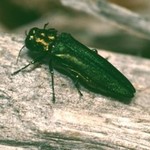 GRAND RAPIDS – Some tiny, parasitic wasps from China no larger than a sesame seed may help halt the destruction of Michigan's dwindling population of ash trees.
GRAND RAPIDS – Some tiny, parasitic wasps from China no larger than a sesame seed may help halt the destruction of Michigan's dwindling population of ash trees.The wasps lay eggs inside the larvae and eggs of emerald ash borers. The baby wasps that hatch feed on their hosts before emerging three weeks later, flying off and repeating the cycle.
If all goes as planned, hundreds of the wasps now being kept at Michigan State University will be released this summer in the Lansing and Jackson areas.
"So far the work looks promising, and everyone working on the program is optimistic the USDA (U.S. Department of Agriculture) will approve the release," said Ken Rauscher, a division director with the Michigan Department of Agriculture.
Leah Bauer, a USDA research entomologist, said the wasps pose no threat to humans or animals and have been found to attack the beetles almost exclusively.
"They zero in on emerald ash borers, and only if the borer is in ash trees," Bauer told The Grand Rapids Press for a Monday story. "These guys are pretty obsessed with ash."
Scientists believe that the beetle came to North America from Asia about eight or 10 years ago in wooden packing material.
Ash borer infestations have been found in more than half of Michigan's 83 counties and an estimated 20 million trees have already succumbed since the pest was discovered in Detroit in 2002.
The beetles threaten the state's 700 million ash trees, forestry experts say.
Michigan is using billboards and bumper stickers to spread public awareness about the pests. Gov. Jennifer Granholm declared May 20-26 Emerald Ash Borer Awareness Week.
Scientists hope that the wasps will stop the ash borers, which have no known predators here.
For decades, scientists have used parasitic wasps, beetles and other beneficial organisms to help control such invasive pests as the cereal leaf beetle, alfalfa weevil, gypsy moth and purple loosestrife.
The concept, called biological control, can help reduce the use of toxic pesticides on agricultural crops while creating a more natural balance in the environment.
The plan to introduce the Chinese wasps has its skeptics.
"Bringing in an exotic species to control an invasive species can create a lot of problems," said Dr. James Dunn, an entomologist who teaches biology at Grand Valley State University.
"There is no guarantee they will kill just the ash borer -- that's the danger," Dunn said. "Maybe the risk is worth taking, I don't know. It is not a slam dunk, though."
Repeated laboratory tests indicate that the wasps aren't interested in native borers, just the emerald ash borer, Bauer said.



